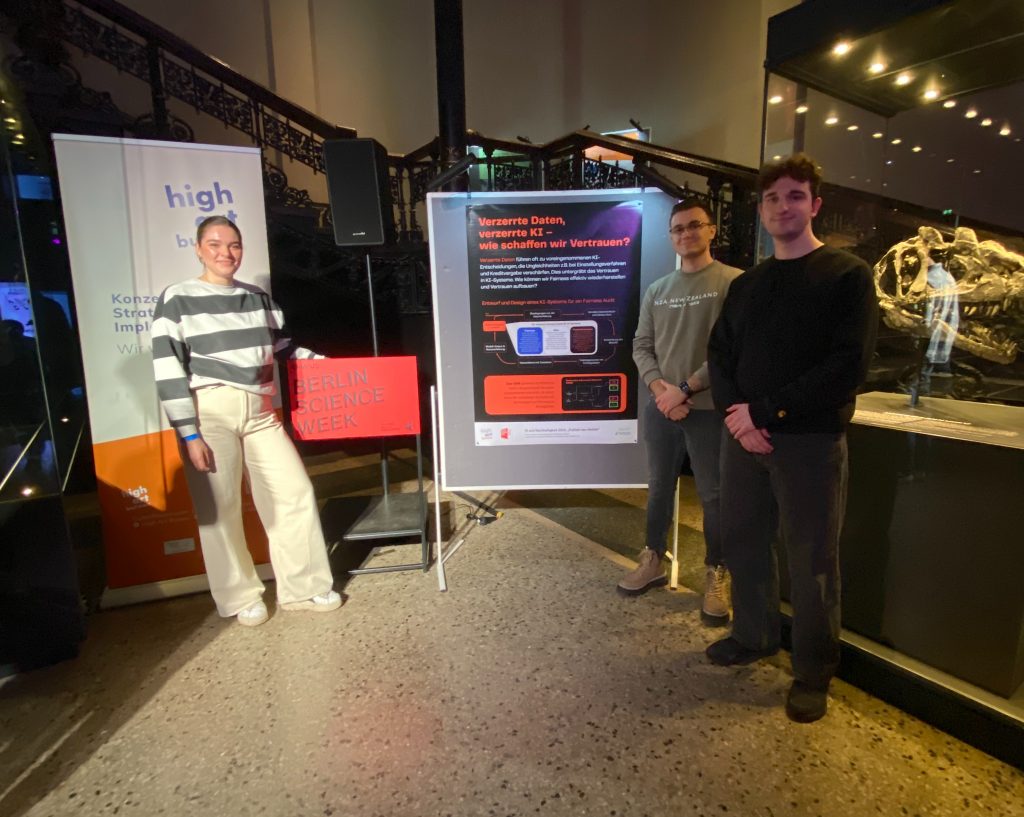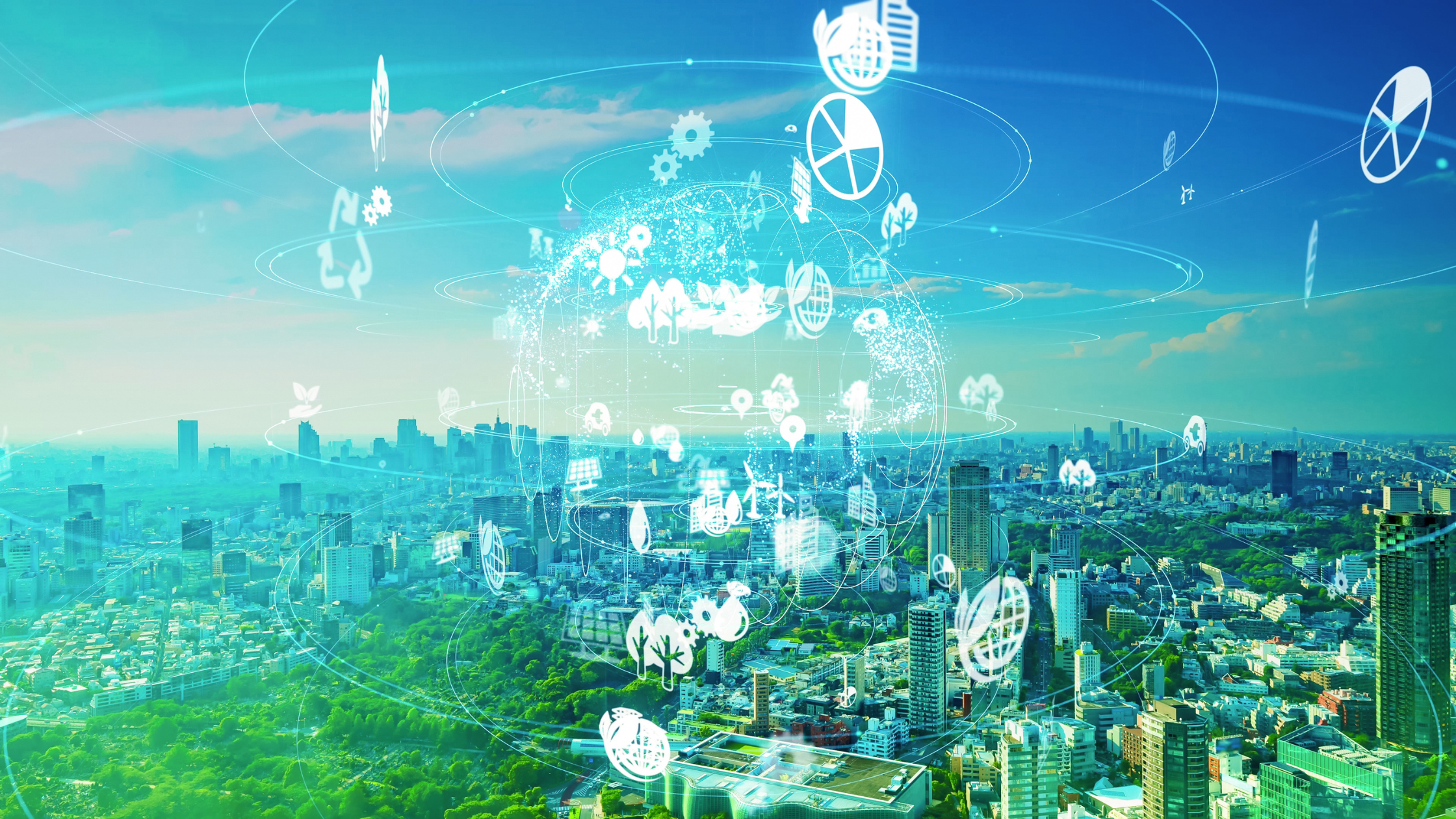AI and sustainability
A contest to identify the advantages and disadvantages of using AI today.
Following the success of „Hidden AI“, we continued our successful cooperation with Berlin Science Week this year and created an exciting and innovative competition with a poster session presentation.
The future of science is being shaped by today’s students and curious young scientists.
It is therefore only consistent that we promote active, controversial and transparent dialogue with and between young scientists and established experts in order to sustainably link innovation and knowledge transfer and thus shape our future.
Together with Berlin Science Week we invited all inquisitive, curious and critical young scientists and students to take part in the “Rethinking Freedom” competition.
Why “Freedom”?
The motto of the Science Year 2024 – initiated by the Federal Ministry of Education and Research – is “Freedom”. On the occasion of the 75th anniversary of the German Basic Law and 35 years since the Peaceful Revolution, freedom will be examined in all its facets for a whole year. Among other things, one main focus will be the question: What does the use of artificial intelligence mean for our freedom?
This year the Berlin Science Week is dedicated to the “Common Ground,” that is, the shared values, beliefs, and goals that people hold despite their individual differences. A common foundation is necessary to protect and promote everyone’s freedom. Consensus on fundamental values and norms, such as respect for freedom of speech, equality, and the rule of law, forms a framework within which people can exercise their freedoms without infringing on the rights of others. Accordingly, it is essential to critically question common assumptions and prejudices that challenge these values. Particularly with artificial intelligence, which relies on existing data, biases and inequalities can be perpetuated, leading to unfair and unjustified algorithmic decisions. In this way, the use of artificial intelligence impacts the freedom of every individual.
Therefore, our 2024 project also addresses the topic of freedom. Under the motto “Rethinking Freedom”, we invite all students and young scientists from Berlin and the surrounding area to submit their project ideas and drafts via application from.
About the competition
The rapidly evolving technologies challenge research and science, industry and civil society alike to innovate and develop. The correlations between artificial intelligence and our freedom are manifold. They range from questions of personal autonomy and privacy to ethical and economic aspects as well as governmental regulation.
This is where the “Rethinking Freedom” competition aims to highlight ideas and approaches that take a science-based look at the consequences of the use of artificial intelligence on freedom. Students and young scientists are invited to submit their project ideas and drafts from the field of artificial intelligence that have not yet been implemented. The focus is on the following key questions:
- How does the use of artificial intelligence affect our freedom?
- Can artificial intelligence protect our freedom, or does it harbour dangers?
- What specific applications and solutions exist in the area between scientific research on artificial intelligence and freedom?
- What significance does the use of artificial intelligence have for civil society?
The submitted works were evaluated by a five-member jury of experts from science and research:
- Johanna Sieben, Director of the Cluster “Public Sector & Engagement”, Falling Walls Foundation,
- Dr. Aljoscha Burchardt, expert in language technology and artificial intelligence, Principal Researcher, Research Fellow and deputy spokesperson of the German Research Center for Artificial Intelligence (DFKI) in Berlin,
- Katja Anclam, AI-Strategist, Managing Director of the German Institute for Good Life (difgl), Executive of female.vision e.V.
- Gerrit Rößler, International Affairs and Science Communication, Berlin Senate Department for Higher Education and Research, Health and Long-Term Care,
- Katy Gaffney, winner of the 2023 competition, Junior Manager Copyright Data Automations at BMG Music Management and Machine Learning Engineer
- and Bengisu Berispek, winner of the 2021 competition and founder of the Sustain.ALL Labs at TU Berlin
The evaluation criteria are:
- Comprehensibility
- Applicability
- Innovative approach
- Scientific character
- Sustainability
On November 1 and 2, 2024, after an intensive poster session, Q&A, and exciting discussions between the young scientists and the jury experts, Eren Yetiskul, Hagen Führer, and Katharina Jäger were crowned the winning team.
Their innovative contribution on the topic “ML-Based Fairness Audits for AI Systems” drew significant interest. The team addressed the important question: “Biased Data, Biased AI—How Can We Build Trust?” Using Generative Adversarial Networks (GANs), the winners developed a solution that evaluates AI systems for fairness, thus enhancing transparency. At the Speaker’s Corner of Berlin Science Week, they had the opportunity to present their work to an engaged audience and share their vision of trustworthy and fair AI.

© High Art Bureau, Adobe Stock
About our partner:
Berlin Science Week: Every year, between 1 and 10 November, Berlin becomes a nexus for celebrating scientific excellence, knowledge and discovery, and promoting innovative exchange. Berlin Science Week brings together more than 500 speakers, over 150 organisations and an audience exceeding 20,000 during the ten festival days.
becomes a nexus for celebrating scientific excellence, knowledge and discovery, and promoting innovative exchange. Berlin Science Week brings together more than 500 speakers, over 150 organisations and an audience exceeding 20,000 during the ten festival days.
The festival combines in person formats throughout Berlin with online and hybrid events. Our focus is on exchange and reflection: the programme is based on interactive and often interdisciplinary formats ranging from panel discussions, workshops, exhibitions, to VR-experiences, film screenings, music installations and much more. Internationally renowned scientists and institutions contribute to topic tracks reflecting the current challenges and debates in science and society.
 Poster printing with kind support from Pinguin Druck.
Poster printing with kind support from Pinguin Druck.
About our partner:
Berlin Science Week: Every year, between 1 and 10 November, Berlin becomes a nexus for celebrating scientific excellence, knowledge and discovery, and promoting innovative exchange. Berlin Science Week brings together more than 500 speakers, over 150 organisations and an audience exceeding 20,000 during the ten festival days.
The festival combines in person formats throughout Berlin with online and hybrid events. Our focus is on exchange and reflection: the programme is based on interactive and often interdisciplinary formats ranging from panel discussions, workshops, exhibitions, to VR-experiences, film screenings, music installations and much more. Internationally renowned scientists and institutions contribute to topic tracks reflecting the current challenges and debates in science and society.

